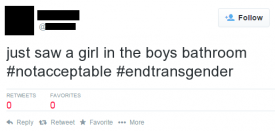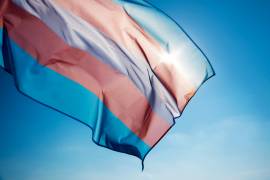When he was a senior in high school, Kyle* was shocked to log on to Twitter one day and see a Tweet from a classmate, which read “Just saw a girl in the boys’ bathroom. #notacceptable #endtransgender.”
Kyle, a Native American transgender young man, knew the Tweet was about him. He also knew that he had a right to use the same bathroom as all the other male students at school, and thought that this incident would prompt school officials to take action to end the bullying.
So when he expressed his concerns to school administrators, he was crushed when they reprimanded him, telling him that he could not use the men’s bathroom because he made other students ‘uncomfortable.’
"The first emotion I felt was outrage,” Kyle said. “The second was sadness, because I knew I was trying to graduate and couldn't get in trouble. Right after I left the principal's office I burst into tears."
High school can be challenging for everyone. For lesbian, gay, bisexual and transgender (LGBT) students, the experience becomes even more difficult when transphobic and homophobic bullying occur and are reinforced by institutional practices that make schools unwelcoming for LGBT students.
Title IX protects all students from sex-based discrimination. This includes discrimination against a transgender student based on that student’s gender identity or transgender status. Despite this, schools routinely ban transgender students from using the bathroom that matches their stated gender identity. Kyle’s school pointed initially to concern for other students’ privacy and comfort – perhaps the most commonly cited reason for these kinds of policies. Later on, school administrators claimed they wanted to avoid Kyle being bullied or harassed.
These arguments, which have been used by many other institutions trying to justify discriminating against transgender people, are unfounded. First, other people’s personal opinions, confusion, or discomfort do not justify preventing transgender people from using the bathroom that corresponds with their gender identity. Second, courts have said that simply allowing a transgender person to use the bathroom according to that person’s gender identity does not violate anyone else’s rights. In contrast, discriminatory bathroom policies increase the hostility and harassment that transgender people often face in public facilities.
In Kyle’s case, the school’s refusal to allow him to use the same bathroom as the other male students actually made the bullying and harassment he faced even worse, as students pointed to the fact that he could not use the men’s bathroom as evidence that he was not “really” male.
“Using fear to justify transphobia betrays students who just want to feel comfortable and accepted,” Kyle says. “This attitude is damaging to mental health and self-esteem.
This attitude also impacts how LGBT students are treated and disciplined in schools. Lambda Legal’s 2012 ‘Protected and Served’ survey found that among respondents aged 18-24, 19% felt they were treated harshly by school officials because of their LGBTQ identity. Respondents who were transgender or non-conforming (TGNC) (26%), especially TGNC people of color (39%) (including Native American students like Kyle (44%)), were even more likely to feel like they were treated harshly because of their sexual orientation, gender identity or gender expression.
Respondents of color (31%), particularly Native American (33%) and Latina/o (45%)students, were also much more likely than other students to hear anti-LGBTQ language.
Given this grave reality, Lambda Legal’s Transgender Rights Project pays special attention to the challenges faced by students like Kyle. But much of this work is done by the students themselves, who each day must navigate difficult and sometimes hostile environments. Kyle is an excellent example of how students can stand up for their rights. He ardently advocated for himself and sought Lambda Legal’s help when the school would not back down. Because the school refused to change its policy we filed a formal complaint with the Department of Education’s Office for Civil Rights which has agreed to investigate the school’s actions. . Although Kyle graduated from high school in June, he hopes that his and Lambda Legal’s advocacy and the OCR investigation will bring about changes that will help other LGBT students at his school and elsewhere.
"The world is changing, and you can fight back,” said Kyle. “My advice to other students is to find advocates. Your school officials and administration are not the final say. There is the law, there are things that are legal and not legal. Schools have to get with the times.”
Lambda Legal’s Transgender Rights Project has worked with other students in similar situations in schools across the country, and in each instance the students display a remarkable sense of persistence and perseverance in advocating for their rights. This dedication follows them beyond graduation, and in Kyle’s case, to a fresh start at a leading school in his state, with the goal of becoming a nurse practitioner and helping ensure access to comprehensive healthcare for other transgender people.
As the start of another school year approaches, I encourage other students dealing with discrimination—whether because of their gender identity and/or sexual orientation—to find advocates who can help and empower them. Lambda Legal’s Know Your Rights hub and Legal Help Desk are two great resources to start.
"Lambda Legal is amazing,” Kyle said. “They help you lift yourself up, so much so that I was finally able to stand up for myself. I was more confident because of Lambda Legal. I could not have done this on my own."
*Name changed to protect identity.





